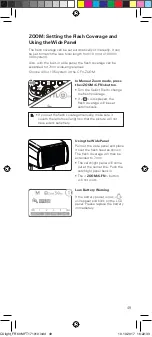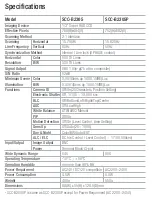
45
Using Fully Automatic Wireless Flash
The FEC and other settings that set on the master unit will also
be appeared on the slave unit automatically. The slave unit does
not need any operation. Use the following settings to make
wireless flashes according to the same methods with normal
flash shooting.
• Flash Exposure Compensation (
/ Page 38)
About Master Unit
Use two or more master units. By preparing several cameras
that with master units flash attached, cameras can be changed
in shooting while keeping the same lighting source (slave unit).
5. M: Wireless Flash Shooting
with Manual Flash
This describes wireless (multiple shooting) using manual flash.
You can shoot with a different flash output setting for each slave
unit (firing group). Set all parameters on the master unit.
1
Setting the flash mode
to <M>
• Press Function Button 4
<
Gr
> to choose groups.
Then, press Function But-
ton 3 <
MODE
> to set the
flash to M mode.
2
Setting flash output
• When choosing the state of
the group, press Function
Button 2 <
> to set
the power output. Turn
the Select Dial to set the
flash output of the groups.
Press the <SET> button to
confirm.
3
Taking the picture
• Each group fires at the set
flash ratio.
6. Multi: Manual Wireless Flash Shooting
Setting <Multi> stroboscopic
flash.
• Press <
MODE
> button so that
<
MULTI
> is displayed.
• Setting the stroboscopic flash.
Using a flash (master/slave) with a radio transmission wireless
shooting function make it easy to shoot with advanced wireless
multiple flash lighting, in the same way as TTL autoflash
shooting.
The basic relative position and operation range are as shown in
the picture. You can then perform wireless TTL autoflash shoot-
ing just by setting the master unit to <
TTL
>.
Setting <Multi>
1
stroboscopic flash.
●
Press <
MODE
> button so
that <
MULTI
> is
displayed.
● Setting the stroboscopic
flash.
Slave Unit Setting
2
●
Set the other camera
flash as the wireless slave
unit. . (Page 42)
● The slave unit can be set
as
A/B/C
.
Check the communication
3
channel
●
If the master unit and
slave unit(s) are set to a
different channel, set them
to the same channel.
(Page 41)
Position the camera and
4
flashes
●
Position the camera and
flashes as the picture
shows. (Page 43)
Check that the flash is
5
ready
●
Check that the master
flash ready indicator is
lightened.
● When the slave flash
ready indicator is ready,
the AF-assist beam
lighting area will blinks at
1 second intervals.
Check the flash operation
6
●
Press the master unit’s
Test Button < >.
●
Then, the slave unit will
fire. If not, check whether
the slave unit is put in the
right position or not.
The slave unit might be out of order or fire an unwanted flash
due to the nearby fluorescent lamp or computer screen.
●
If the slave unit’s auto power off function is workable, press
the master unit’s test button to power it on. Please note that
test firing is unavailable during the camera’s regular
metering time.
●
The effective time of slave auto power off is changeable.
(C.Fn-Sv APOT/ Page 47)
●
By making some settings, the auto AF-assist transmitter will
not blink after the slave unit’s flash ready indicator is
lightened. (C.Fn-AF/ Page 47)
Using Fully Automatic Wireless Flash
The FEC and other settings that set on the master unit will also be
appeared on the slave unit automatically. The slave unit does not
need any operation. Use the following settings to make wireless
flashes according to the same methods with normal flash shooting.
●
Flash Exposure Compensation
( /
Page 33
)
About Master Unit
Use two or more master units. By preparing several cameras that
with master units flash attached, cameras can be changed in
shooting while keeping the same lighting source (slave unit).
5. M: Wireless Flash Shooting with Manual Flash
This describes wireless (multiple shooting) using manual flash. You
can shoot with a different flash output setting for each slave unit
(firing group). Set all parameters on the master unit.
Gr
Setting the flash mode to
1
<M>
●
Press Function Button 4
< > to choose groups.
Then, press Function
Button 3 <
MODE
> to set
the flash to M mode.
Setting flash output
2
●
When choosing the state
of the group, press
Function Button 2 < >
to set the power output.
Turn the Select Dial to set
the flash output of the
groups. Press the <SET>
button to confirm.
Taking the picture
3
●
Each group fires at the set
flash ratio.
Using a flash (master/slave) with a radio transmission wireless
shooting function make it easy to shoot with advanced wireless
multiple flash lighting, in the same way as TTL autoflash shooting.
The basic relative position and operation range are as shown in the
picture. You can then perform wireless TTL autoflash shooting just
by setting the master unit to <
TTL
>.
6.
Multi: Manual Wireless Flash Shooting
- 39 -
- 40 -
Setting <Multi>
1
stroboscopic flash.
●
Press <
MODE
> button so
that <
MULTI
> is
displayed.
● Setting the stroboscopic
flash.
Slave Unit Setting
2
●
Set the other camera
flash as the wireless slave
unit. . (Page 42)
● The slave unit can be set
as
A/B/C
.
Check the communication
3
channel
●
If the master unit and
slave unit(s) are set to a
different channel, set them
to the same channel.
(Page 41)
Position the camera and
4
flashes
●
Position the camera and
flashes as the picture
shows. (Page 43)
Check that the flash is
5
ready
●
Check that the master
flash ready indicator is
lightened.
● When the slave flash
ready indicator is ready,
the AF-assist beam
lighting area will blinks at
1 second intervals.
Check the flash operation
6
●
Press the master unit’s
Test Button < >.
●
Then, the slave unit will
fire. If not, check whether
the slave unit is put in the
right position or not.
The slave unit might be out of order or fire an unwanted flash
due to the nearby fluorescent lamp or computer screen.
●
If the slave unit’s auto power off function is workable, press
the master unit’s test button to power it on. Please note that
test firing is unavailable during the camera’s regular
metering time.
●
The effective time of slave auto power off is changeable.
(C.Fn-Sv APOT/ Page 47)
●
By making some settings, the auto AF-assist transmitter will
not blink after the slave unit’s flash ready indicator is
lightened. (C.Fn-AF/ Page 47)
Using Fully Automatic Wireless Flash
The FEC and other settings that set on the master unit will also be
appeared on the slave unit automatically. The slave unit does not
need any operation. Use the following settings to make wireless
flashes according to the same methods with normal flash shooting.
●
Flash Exposure Compensation
( /
Page 33
)
About Master Unit
Use two or more master units. By preparing several cameras that
with master units flash attached, cameras can be changed in
shooting while keeping the same lighting source (slave unit).
5. M: Wireless Flash Shooting with Manual Flash
This describes wireless (multiple shooting) using manual flash. You
can shoot with a different flash output setting for each slave unit
(firing group). Set all parameters on the master unit.
Gr
Setting the flash mode to
1
<M>
●
Press Function Button 4
< > to choose groups.
Then, press Function
Button 3 <
MODE
> to set
the flash to M mode.
Setting flash output
2
●
When choosing the state
of the group, press
Function Button 2 < >
to set the power output.
Turn the Select Dial to set
the flash output of the
groups. Press the <SET>
button to confirm.
Taking the picture
3
●
Each group fires at the set
flash ratio.
Using a flash (master/slave) with a radio transmission wireless
shooting function make it easy to shoot with advanced wireless
multiple flash lighting, in the same way as TTL autoflash shooting.
The basic relative position and operation range are as shown in the
picture. You can then perform wireless TTL autoflash shooting just
by setting the master unit to <
TTL
>.
6.
Multi: Manual Wireless Flash Shooting
- 39 -
- 40 -
CUlight_FR 60MFT 171010.indd 45
10.10.2017 16:22:31











































